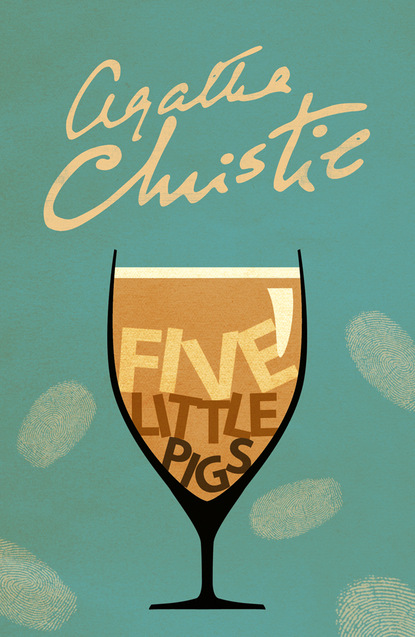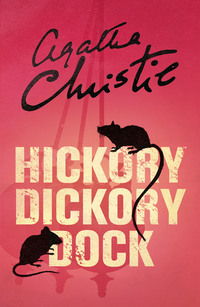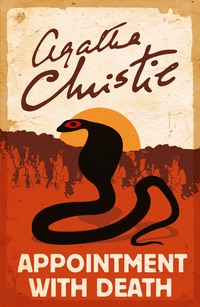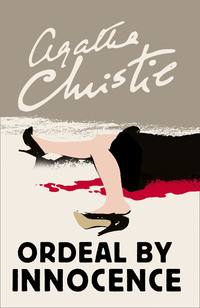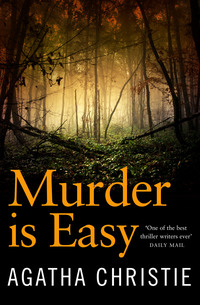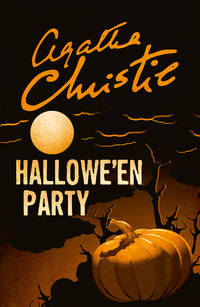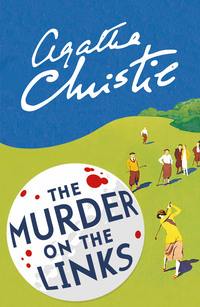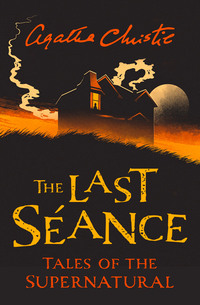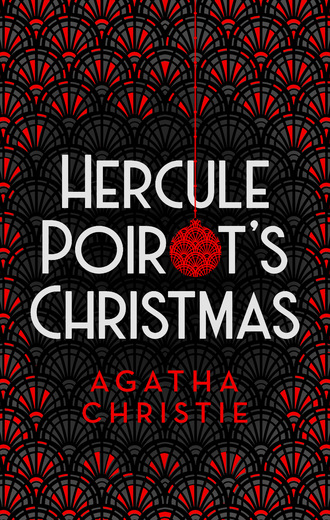
Полная версия
Hercule Poirot’s Christmas
Lydia said slowly:
‘After the—adventurous life he has led.’
The pause she made before the adjective gave it some special though obscure significance. Alfred seemed to feel it. He flushed and looked unhappy.
She cried out suddenly:
‘How he ever had a son like you, I can’t imagine! You two are poles apart. And he fascinates you—you simply worship him!’
Alfred said with a trace of vexation:
‘Aren’t you going a little far, Lydia? It’s natural, I should say, for a son to love his father. It would be very unnatural not to do so.’
Lydia said:
‘In that case, most of the members of this family are—unnatural! Oh, don’t let’s argue! I apologize. I’ve hurt your feelings, I know. Believe me, Alfred, I really didn’t mean to do that. I admire you enormously for your—your—fidelity. Loyalty is such a rare virtue in these days. Let us say, shall we, that I am jealous? Women are supposed to be jealous of their mothers-in-law—why not, then, of their fathers-in-law?’
He put a gentle arm round her.
‘Your tongue runs away with you, Lydia. There’s no reason for you to be jealous.’
She gave him a quick remorseful kiss, a delicate caress on the tip of his ear.
‘I know. All the same, Alfred, I don’t believe I should have been in the least jealous of your mother. I wish I’d known her.’
‘She was a poor creature,’ he said.
His wife looked at him interestedly.
‘So that’s how she struck you…as a poor creature…That’s interesting.’
He said dreamily:
‘I remember her as nearly always ill…Often in tears…’ He shook his head. ‘She had no spirit.’
Still staring at him, she murmured very softly:
‘How odd…’
But as he turned a questioning glance on her, she shook her head quickly and changed the subject.
‘Since we are not allowed to know who our mysterious guests are I shall go out and finish my garden.’
‘It’s very cold, my dear, a biting wind.’
‘I’ll wrap up warmly.’
She left the room. Alfred Lee, left alone, stood for some minutes motionless, frowning a little to himself, then he walked over to the big window at the end of the room. Outside was a terrace running the whole length of the house. Here, after a minute or two, he saw Lydia emerge, carrying a flat basket. She was wearing a big blanket coat. She set down the basket and began to work at a square stone sink slightly raised above ground level.
Her husband watched for some time. At last he went out of the room, fetched himself a coat and muffler, and emerged on to the terrace by a side door. As he walked along he passed various other stone sinks arranged as miniature gardens, all the products of Lydia’s agile fingers.
One represented a desert scene with smooth yellow sand, a little clump of green palm trees in coloured tin, and a procession of camels with one or two little Arab figures. Some primitive mud houses had been constructed of plasticine. There was an Italian garden with terraces and formal beds with flowers in coloured sealing-wax. There was an Arctic one, too, with clumps of green glass for icebergs, and a little cluster of penguins. Next came a Japanese garden with a couple of beautiful little stunted trees, looking-glass arranged for water, and bridges modelled out of plasticine.
He came at last to stand beside her where she was at work. She had laid down blue paper and covered it over with glass. Round this were lumps of rock piled up. At the moment she was pouring out coarse pebbles from a little bag and forming them into a beach. Between the rocks were some small cactuses.
Lydia was murmuring to herself:
‘Yes, that’s exactly right—exactly what I want.’
Alfred said:
‘What’s this latest work of art?’
She started, for she had not heard him come up.
‘This? Oh, it’s the Dead Sea, Alfred. Do you like it?’
He said, ‘It’s rather arid, isn’t it? Oughtn’t there to be more vegetation?’
She shook her head.
‘It’s my idea of the Dead Sea. It is dead, you see—’
‘It’s not so attractive as some of the others.’
‘It’s not meant to be specially attractive.’
Footsteps sounded on the terrace. An elderly butler, white-haired and slightly bowed, was coming towards them.
‘Mrs George Lee on the telephone, madam. She says will it be convenient if she and Mr George arrive by the five-twenty tomorrow?’
‘Yes, tell her that will be quite all right.’
‘Thank you, madam.’
The butler hurried away. Lydia looked after him with a softened expression on her face.
‘Dear old Tressilian. What a standby he is! I can’t imagine what we should do without him.’
Alfred agreed.
‘He’s one of the old school. He’s been with us nearly forty years. He’s devoted to us all.’
Lydia nodded.
‘Yes. He’s like the faithful old retainers of fiction. I believe he’d lie himself blue in the face if it was necessary to protect one of the family!’
Alfred said:
‘I believe he would…Yes, I believe he would.’
Lydia smoothed over the last bit of her shingle.
‘There,’ she said. ‘That’s ready.’
‘Ready?’ Alfred looked puzzled.
She laughed.
‘For Christmas, silly! For this sentimental family Christmas we’re going to have.’
IV
David was reading the letter. Once he screwed it up into a ball and thrust it away from him. Then, reaching for it, he smoothed it out and read it again.
Quietly, without saying anything, his wife, Hilda, watched him. She noted the jerking muscle (or was it a nerve?) in his temple, the slight tremor of the long delicate hands, the nervous spasmodic movements of his whole body. When he pushed aside the lock of fair hair that always tended to stray down over his forehead and looked across at her with appealing blue eyes she was ready.
‘Hilda, what shall we do about it?’
Hilda hesitated a minute before speaking. She had heard the appeal in his voice. She knew how dependent he was upon her—had always been ever since their marriage—knew that she could probably influence his decision finally and decisively. But for just that reason she was chary of pronouncing anything too final.
She said, and her voice had the calm, soothing quality that can be heard in the voice of an experienced nannie in a nursery:
‘It depends on how you feel about it, David.’
A broad woman, Hilda, not beautiful, but with a certain magnetic quality. Something about her like a Dutch picture. Something warming and endearing in the sound of her voice. Something strong about her—the vital hidden strength that appeals to weakness. An over-stout dumpy middle-aged woman—not clever—not brilliant—but with something about her that you couldn’t pass over. Force! Hilda Lee had force!
David got up and began pacing up and down. His hair was practically untouched by grey. He was strangely boyish-looking. His face had the mild quality of a Burne Jones knight. It was, somehow, not very real…
He said, and his voice was wistful:
‘You know how I feel about it, Hilda. You must.’
‘I’m not sure.’
‘But I’ve told you—I’ve told you again and again! How I hate it all—the house and the country round and everything! It brings back nothing but misery. I hated every moment that I spent there! When I think of it—of all that she suffered—my mother…’
His wife nodded sympathetically.
‘She was so sweet, Hilda, and so patient. Lying there, often in pain, but bearing it—enduring everything. And when I think of my father’—his face darkened—‘bringing all that misery into her life—humiliating her—boasting of his love affairs—constantly unfaithful to her and never troubling to conceal it.’
Hilda Lee said:
‘She should not have put up with it. She should have left him.’
He said with a touch of reproof:
‘She was too good to do that. She thought it was her duty to remain. Besides, it was her home—where else should she go?’
‘She could have made a life of her own.’
David said fretfully:
‘Not in those days! You don’t understand. Women didn’t behave like that. They put up with things. They endured patiently. She had us to consider. Even if she divorced my father, what would have happened? He would probably have married again. There might have been a second family. Our interests might have gone to the wall. She had to think of all those considerations.’
Hilda did not answer.
David went on:
‘No, she did right. She was a saint! She endured to the end—uncomplainingly.’
Hilda said, ‘Not quite uncomplainingly or you would not know so much, David!’
He said softly, his face lighting up:
‘Yes—she told me things—She knew how I loved her. When she died—’
He stopped. He ran his hands through his hair.
‘Hilda, it was awful—horrible! The desolation! She was quite young still, she needn’t have died. He killed her—my father! He was responsible for her dying. He broke her heart. I decided then that I’d not go on living under his roof. I broke away—got away from it all.’
Hilda nodded.
‘You were very wise,’ she said. ‘It was the right thing to do.’
David said:
‘Father wanted me to go into the works. That would have meant living at home. I couldn’t have stood that. I can’t think how Alfred stands it—how he has stood it all these years.’
‘Did he never rebel against it?’ asked Hilda with some interest. ‘I thought you told me something about his having given up some other career.’
David nodded.
‘Alfred was going into the army. Father arranged it all. Alfred, the eldest, was to go into some cavalry regiment, Harry was to go into the works, so was I. George was to enter politics.’
‘And it didn’t work out like that?’
David shook his head.
‘Harry broke all that up! He was always frightfully wild. Got into debt—and all sorts of other troubles. Finally he went off one day with several hundred pounds that didn’t belong to him, leaving a note behind him saying an office stool didn’t suit him and he was going to see the world.’
‘And you never heard any more of him?’
‘Oh, yes, we did!’ David laughed. ‘We heard quite often! He was always cabling for money from all over the world. He usually got it too!’
‘And Alfred?’
‘Father made him chuck up the army and come back and go into the works.’
‘Did he mind?’
‘Very much to begin with. He hated it. But Father could always twist Alfred round his little finger. He’s absolutely under Father’s thumb still, I believe.’
‘And you—escaped!’ said Hilda.
‘Yes. I went to London and studied painting. Father told me plainly that if I went off on a fool’s errand like that I’d get a small allowance from him during his lifetime and nothing when he died. I said I didn’t care. He called me a young fool, and that was that! I’ve never seen him since.’
Hilda said gently:
‘And you haven’t regretted it?’
‘No, indeed. I realize I shan’t ever get anywhere with my art. I shall never be a great artist—but we’re happy enough in this cottage—we’ve got everything we want—all the essentials. And if I die, well, my life’s insured for you.’
He paused and then said:
‘And now—this!’
He struck the letter with his open hand.
‘I am sorry your father ever wrote that letter, if it upsets you so much,’ said Hilda.
David went on as though he had not heard her.
‘Asking me to bring my wife for Christmas, expressing a hope that we may be all together for Christmas; a united family! What can it mean?’
Hilda said:
‘Need it mean anything more than it says?’
He looked at her questioningly.
‘I mean,’ she said, smiling, ‘that your father is growing old. He’s beginning to feel sentimental about family ties. That does happen, you know.’
‘I suppose it does,’ said David slowly.
‘He’s an old man and he’s lonely.’
He gave her a quick look.
‘You want me to go, don’t you, Hilda?’
She said slowly:
‘It seems a pity—not to answer an appeal. I’m old-fashioned, I dare say, but why not have peace and goodwill at Christmas time?’
‘After all I’ve told you?’
‘I know, dear, I know. But all that’s in the past. It’s all done and finished with.’
‘Not for me.’
‘No, because you won’t let it die. You keep the past alive in your own mind.’
‘I can’t forget.’
‘You won’t forget—that’s what you mean, David.’
His mouth set in a firm line.
‘We’re like that, we Lees. We remember things for years—brood about them, keep memory green.’
Hilda said with a touch of impatience:
‘Is that anything to be proud of? I do not think so!’
He looked thoughtfully at her, a touch of reserve in his manner.
He said: ‘You don’t attach much value to loyalty, then—loyalty to a memory?’
Hilda said:
‘I believe the present matters—not the past! The past must go. If we seek to keep the past alive, we end, I think, by distorting it. We see it in exaggerated terms—a false perspective.’
‘I can remember every word and every incident of those days perfectly,’ said David passionately.
‘Yes, but you shouldn’t, my dear! It isn’t natural to do so! You’re applying the judgment of a boy to those days instead of looking back on them with the more temperate outlook of a man.’
‘What difference would that make?’ demanded David.
Hilda hesitated. She was aware of unwisdom in going on, and yet there were things she badly wanted to say.
‘I think,’ she said, ‘that you’re seeing your father as a bogy! Probably, if you were to see him now, you would realize that he was only a very ordinary man; a man, perhaps, whose passions ran away with him, a man whose life was far from blameless, but nevertheless merely a man—not a kind of inhuman monster!’
‘You don’t understand! His treatment of my mother—’
Hilda said gravely:
‘There is a certain kind of meekness—of submission— brings out the worst in a man—whereas that same man, faced by spirit and determination, might be a different creature!’
‘So you say it was her fault—’
Hilda interrupted him.
‘No, of course I don’t! I’ve no doubt your father treated your mother very badly indeed, but marriage is an extraordinary thing—and I doubt if any outsider—even a child of the marriage—has the right to judge. Besides, all this resentment on your part now cannot help your mother. It is all gone—it is behind you! What is left now is an old man, in feeble health, asking his son to come home for Christmas.’
‘And you want me to go?’
Hilda hesitated, then she suddenly made up her mind. ‘Yes,’ she said. ‘I do. I want you to go and lay the bogy once and for all.’
V
George Lee, M.P. for Westeringham, was a somewhat corpulent gentleman of forty-one. His eyes were pale blue and slightly prominent with a suspicious expression, he had a heavy jowl, and a slow pedantic utterance.
He said now in a weighty manner:
‘I have told you, Magdalene, that I think it my duty to go.’
His wife shrugged her shoulders impatiently.
She was a slender creature, a platinum blonde with plucked eyebrows and a smooth egg-like face. It could, on occasions, look quite blank and devoid of any expression whatever. She was looking like that now.
‘Darling,’ she said, ‘it will be perfectly grim, I am sure of it.’
‘Moreover,’ said George Lee, and his face lit up as an attractive idea occurred to him, ‘it will enable us to save considerably. Christmas is always an expensive time. We can put the servants on board wages.’
‘Oh, well!’ said Magdalene. ‘After all, Christmas is pretty grim anywhere!’
‘I suppose,’ said George, pursuing his own line of thought, ‘they will expect to have a Christmas dinner? A nice piece of beef, perhaps, instead of a turkey.’
‘Who?’ The servants? Oh, George, don’t fuss so. You’re always worrying about money.’
‘Somebody has to worry,’ said George.
‘Yes, but it’s absurd to pinch and scrape in all these little ways. Why don’t you make your father give you some more money?’
‘He already gives me a very handsome allowance.’
‘It’s awful to be completely dependent on your father, as you are! He ought to settle some money on you outright.’
‘That’s not his way of doing things.’
Magdalene looked at him. Her hazel eyes were suddenly sharp and keen. The expressionless egg-like face showed sudden meaning.
‘He’s frightfully rich, isn’t he, George? A kind of millionaire, isn’t he?’
‘A millionaire twice over, I believe.’
Magdalene gave an envious sigh.
‘How did he make it all? South Africa, wasn’t it?’
‘Yes, he made a big fortune there in his early days. Mainly diamonds.’
‘Thrilling!’ said Magdalene.
‘Then he came to England and started in business and his fortune has actually doubled or trebled itself, I believe.’
‘What will happen when he dies?’ asked Magdalene.
‘Father’s never said much on the subject. Of course one can’t exactly ask. I should imagine that the bulk of his money will go to Alfred and myself. Alfred, of course, will get the larger share.’
‘You’ve got other brothers, haven’t you?’
‘Yes, there’s my brother David. I don’t fancy he will get much. He went off to do art or some tomfoolery of that kind. I believe Father warned him that he would cut him out of his will and David said he didn’t care.’
‘How silly!’ said Magdalene with scorn.
‘There was my sister Jennifer too. She went off with a foreigner—a Spanish artist—one of David’s friends. But she died just over a year ago. She left a daughter, I believe. Father might leave a little money to her, but nothing much. And of course there’s Harry—’
He stopped, slightly embarrassed.
‘Harry?’ said Magdalene, surprised. ‘Who is Harry?’
‘Ah—er—my brother.’
‘I never knew you had another brother.’
‘My dear, he wasn’t a great—er—credit—to us. We don’t mention him. His behaviour was disgraceful. We haven’t heard anything of him for some years now. He’s probably dead.’
Magdalene laughed suddenly.
‘What is it? What are you laughing at?’
Magdalene said:
‘I was only thinking how funny it was that you—you, George, should have a disreputable brother! You’re so very respectable.’
‘I should hope so,’ said George coldly.
Her eyes narrowed.
‘Your father isn’t—very respectable, George.’
‘Really, Magdalene!’
‘Sometimes the things he says make me feel quite uncomfortable.’
George said:
‘Really, Magdalene, you surprise me. Does—er—does Lydia feel the same?’
‘He doesn’t say the same kind of things to Lydia,’ said Magdalene. She added angrily, ‘No, he never says them to her. I can’t think why not.’
George glanced at her quickly and then glanced away.
‘Oh, well,’ he said vaguely. ‘One must make allowances. At Father’s age—and with his health being so bad—’
He paused. His wife asked:
‘Is he really—pretty ill?’
‘Oh, I wouldn’t say that. He’s remarkably tough. All the same, since he wants to have his family round him at Christmas, I think we are quite right to go. It may be his last Christmas.’
She said sharply:
‘You say that, George, but really, I suppose, he may live for years?’
Slightly taken aback, her husband stammered:
‘Yes—yes, of course he may.’
Magdalene turned away.
‘Oh, well,’ she said, ‘I suppose we’re doing the right thing by going.’
‘I have no doubt about it.’
‘But I hate it! Alfred’s so dull, and Lydia snubs me.’
‘Nonsense.’
‘She does. And I hate that beastly manservant.’
‘Old Tressilian?’
‘No, Horbury. Sneaking round like a cat and smirking.’
‘Really, Magdalene, I can’t see that Horbury can affect you in any way!’
‘He just gets on my nerves, that’s all. But don’t let’s bother. We’ve got to go, I can see that. Won’t do to offend the old man.’
‘No—no, that’s just the point. About the servants’ Christmas dinner—’
‘Not now, George, some other time. I’ll just ring up Lydia and tell her that we’ll come by the five-twenty tomorrow.’
Magdalene left the room precipitately. After telephoning she went up to her own room and sat down in front of the desk. She let down the flap and rummaged in its various pigeon-holes. Cascades of bills came tumbling out. Magdalene sorted through them, trying to arrange them in some kind of order. Finally, with an impatient sigh, she bundled them up and thrust them back whence they had come. She passed a hand over her smooth platinum head.
‘What on earth am I to do?’ she murmured.
VI
On the first floor of Gorston Hall a long passage led to a big room overlooking the front drive. It was a room furnished in the more flamboyant of old-fashioned styles. It had heavy brocaded wallpaper, rich leather armchairs, large vases embossed with dragons, sculptures in bronze…Everything in it was magnificent, costly and solid.
In a big grandfather armchair, the biggest and most imposing of all the chairs, sat the thin, shrivelled figure of an old man. His long clawlike hands rested on the arms of the chair. A gold-mounted stick was by his side. He wore an old shabby blue dressing-gown. On his feet were carpet slippers. His hair was white and the skin of his face was yellow.
A shabby, insignificant figure, one might have thought. But the nose, aquiline and proud, and the eyes, dark and intensely alive, might cause an observer to alter his opinion. Here was fire and life and vigour.
Old Simeon Lee cackled to himself, a sudden, high cackle of amusement.
He said:
‘You gave my message to Mrs Alfred, hey?’
Horbury was standing beside his chair. He replied in his soft deferential voice:
‘Yes, sir.’
‘Exactly in the words I told you? Exactly, mind?’
‘Yes, sir. I didn’t make a mistake, sir.’
‘No—you don’t make mistakes. You’d better not make mistakes either—or you’ll regret it! And what did she say, Horbury? What did Mr Alfred say?’
Quietly, unemotionally, Horbury repeated what had passed. The old man cackled again and rubbed his hands together.
‘Splendid…First rate…They’ll have been thinking and wondering—all the afternoon! Splendid! I’ll have ’em up now. Go and get them.’
‘Yes, sir.’
Horbury walked noiselessly across the room and went out.
‘And, Horbury—’
The old man looked round, then cursed to himself.
‘Fellow moves like a cat. Never know where he is.’
He sat quite still in his chair, his fingers caressing his chin till there was a tap on the door, and Alfred and Lydia came in.
‘Ah, there you are, there you are. Sit here, Lydia, my dear, by me. What a nice colour you’ve got.’
‘I’ve been out in the cold. It makes one’s cheeks burn afterwards.’
Alfred said:
‘How are you, Father, did you have a good rest this afternoon?’
‘First rate—first rate. Dreamt about the old days! That was before I settled down and became a pillar of society.’
He cackled with sudden laughter.
His daughter-in-law sat silently smiling with polite attention.
Alfred said:






